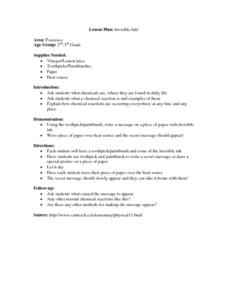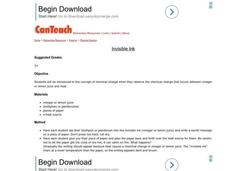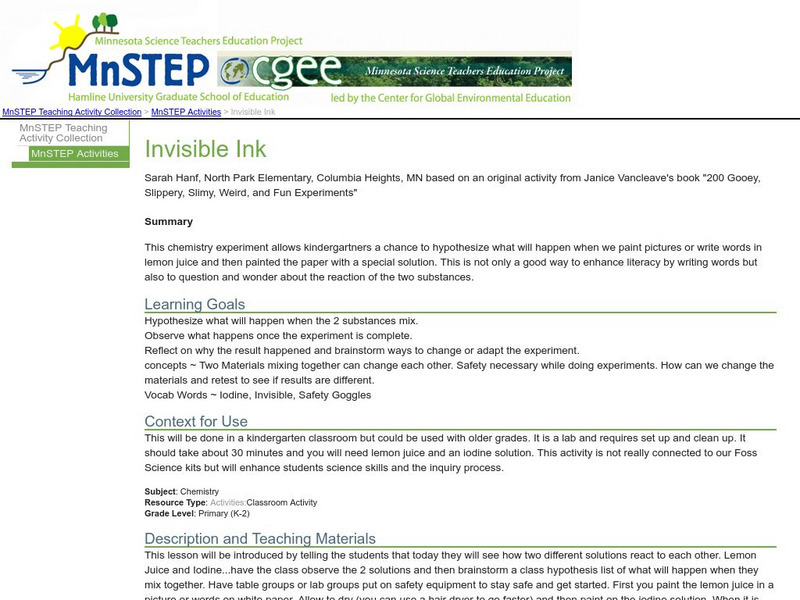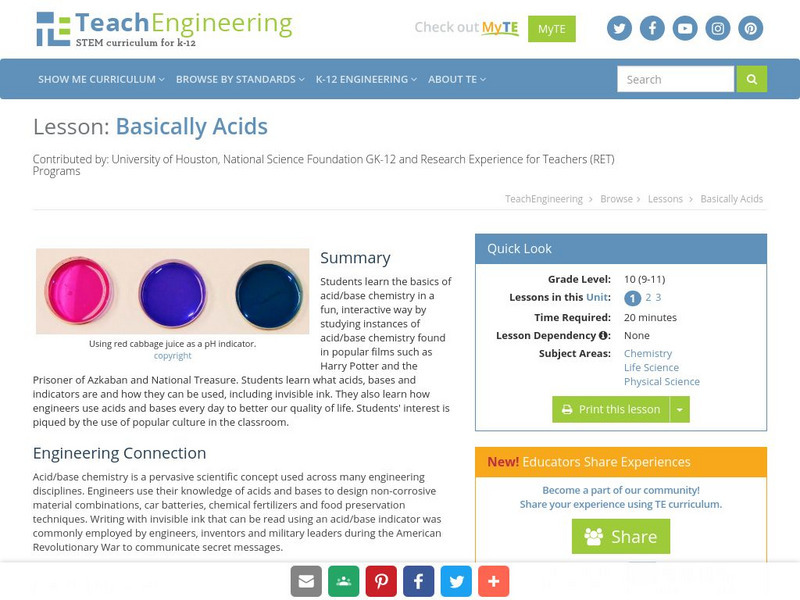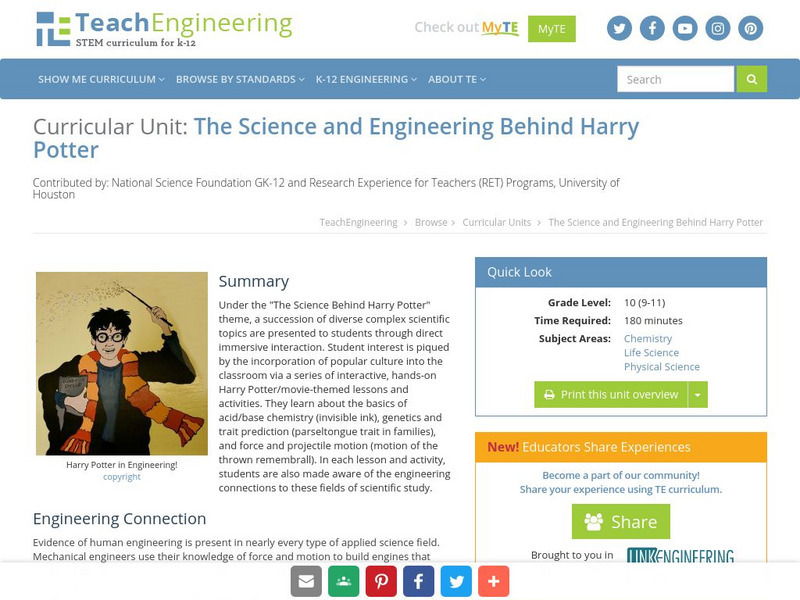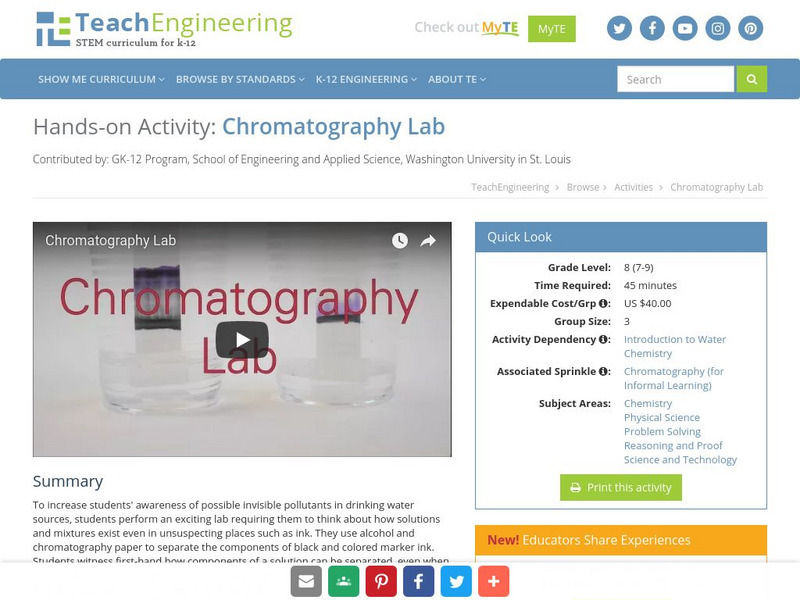Curated OER
How to Make Invisible Ink
Students learn how to make two types of invisible ink. In this invisible ink lesson plan, students will make two types of invisible ink using common house hold items. They will then write a paper comparing and contrasting each type of ink.
Teach Engineering
Basically Acidic Ink
If you don't want to drink red cabbage juice, here's another use for it—a decoder! Using vinegar and ammonia-based window cleaning liquids as invisible inks, scholars create designs in the second lesson of the series. Red cabbage juice...
Curated OER
Ink
Here is an interesting lesson that has learners make ink from two common food items. First, they make ink from beets, then they make ink from onions. The recipes necessary for each are present in the plan. The special thing about the ink...
Curated OER
Invisible Ink!
Pupils explore how chemical reactions occur. After a brief discussion of household chemicals and how they work, students prepare a solution of invisible ink. Pupils create a message with their ink and watch the reaction as their ink...
Curated OER
Revolutionary War Spy Methods
Students research how coded messages were used during the Revolutionary War. In this Revolutionary War lesson, students view primary documents about the Revolutionary War spies and the methods used for sending messages. Students write a...
Curated OER
Invisible Ink - Demonstration
Students observe a demonstration that shows that the indicator, phenolphthalein, is a chemical that displays different colors depending on either the acidity or the basicity of the environment. They use the substance to reveal secret...
Curated OER
Invisible Ink
Students wxplore acids and indicators by watching a demostration in which "magic" ink appears. They duplicate the demonstration by writing magic messages using phenolphthalein solution and painting the message with vinegar to show it.
Teach Engineering
Basically Acids
Base your lesson plan on acids and bases on an informative resource. The first installment of a five-part module on the science behind Harry Potter has individuals investigate acid/base chemistry with the use of invisible inks. They also...
Teach Engineering
Chromatography Lab
Groups use alcohol and chromatography paper to separate the color components of black ink. The purpose of the activity is to allow the class to become aware that mixtures exist in hidden places.
Curated OER
Invisible Ink
Students are introduced to the concept of chemical change when they observe the chemical change that occurs between vinegar or lemon juice and heat.
Curated OER
Starch
Students examine the basics of starch and how it is used in food. In this photosynthesis lesson students experiment with variables that affect starch production in photosynthesis.
Curated OER
Magic in the Classroom
Captivate students while covering content by incorporating magic into your day.
Curated OER
Secrets and Spies
Learners explore the lives of spies. In this secret government agencies lesson plan, students visit the Imperial War Museum and the Essex Secret Bunker online or in person to discover details about Britain's spies and secret bunker.
Curated OER
Food Safety Lab-Part 3 Cross Contamination andHygiene
Students observe the effect of croos contamination as they inoculate orange juice with penicillin mold from the refrigeration lab and active yeast solution from the sterilization lab. They experience a simulation of passing bacteria...
Science Education Resource Center at Carleton College
Serc: Invisible Ink
Students will get to experiment with "invisible ink" to enhance their literacy skills and their understandings of reactions between two substances.
Science Struck
Science Struck: Make Invisible Ink for Your Science Fair Project
Three methods of making invisible ink are demonstrated with illustrations and step-by-step instructions.
TeachEngineering
Teach Engineering: Basically Acids
Students learn the basics of acid/base chemistry in a fun, interactive way by studying instances of acid/base chemistry found in popular films such as Harry Potter and the Prisoner of Azkaban and National Treasure. Students learn what...
TeachEngineering
Teach Engineering: Basically Acidic Ink
Students hypothesize whether vinegar and ammonia-based glass cleaner are acids or bases. They create designs on index cards using these substances as invisible inks. After the index cards have dried, they apply red cabbage juice as an...
Maryland Science Center
Maryland Science Center: One Ring to Rule Them All [Pdf]
A simple experiment to create a secret message using invisible ink, in honor of J.R.R. Tolkien's birthday and the Ring in The Lord of the Rings.
TeachEngineering
Teach Engineering: Engineering Out of Harry Situations
Under the "The Science Behind Harry Potter" theme, a succession of diverse complex scientific topics are presented to students through direct immersive interaction. Student interest is piqued by the incorporation of popular culture into...
Other
The Science House: Invisible Ink
Guidelines for a simple lab demonstration using phenolphthalein, a chemical that changes color depending on whether it is in the presence of an acid or base.
TeachEngineering
Teach Engineering: Chromatography Lab
To increase students' awareness of possible invisible pollutants in drinking water sources, students perform an exciting lab requiring them to think about how solutions and mixtures exist even in unsuspecting places such as ink. They use...





